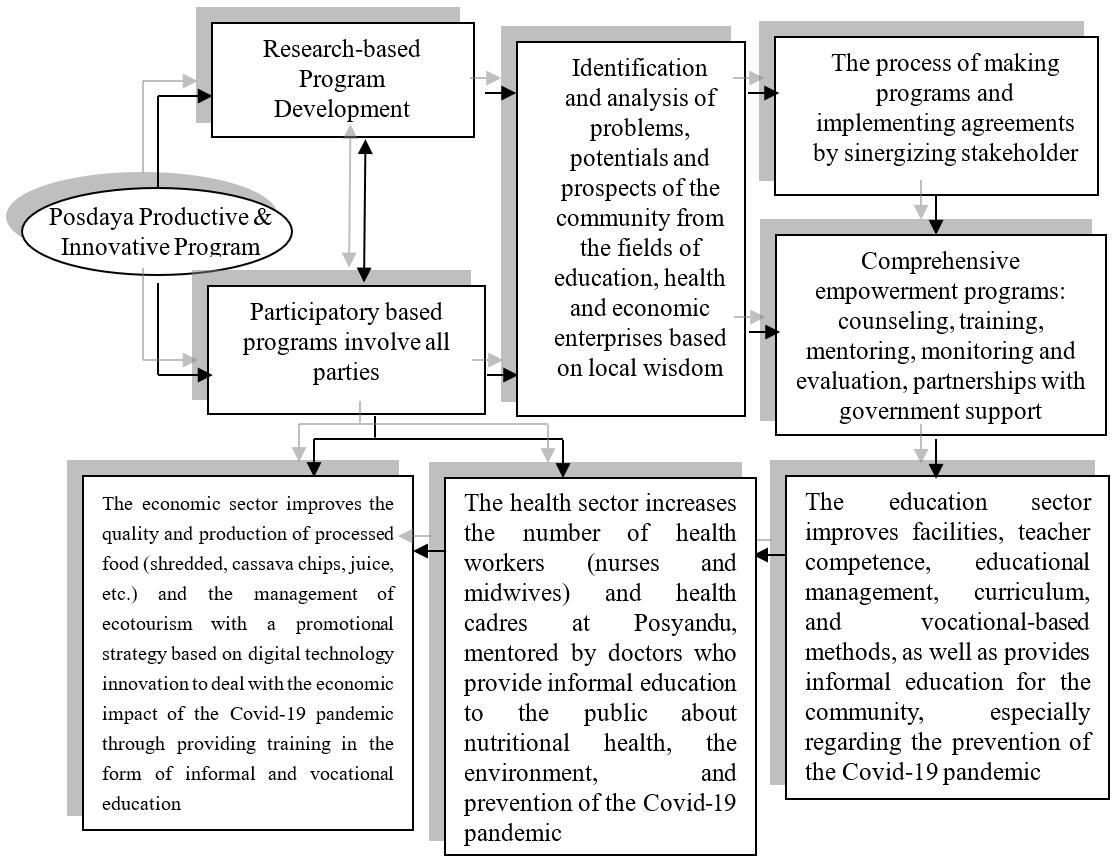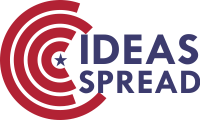Designing Family Empowerment Program: Community Education in Times of Covid-19 Pandemic
Abstract
The Family Empowerment Post (Posdaya) has been running as a model for implementing community development, especially in rural areas in the fields of education, health and economy. However, it has only provided minimum service standards and has not been able to achieve the maximum in terms of transferring knowledge and skills to the community. Therefore, this study aimed to design an empowerment program through community education to deal with the Covid-19 pandemic. Using the qualitative case study, informants were selected purposively from the village government, Posdaya administrators and members, community and youth leaders and entrepreneurial groups. Data collection was carried out through observation, interviews, discussion and document analysis. Triangulation was used as verification of the data collected. The results showed that responsive, productive and innovative empowerment programs in the form of informal and vocational learning based on local resources are needed as a medium to increase motivation, knowledge and entrepreneurial skills of the community to maintain the welfare and the health of family members and village communities, especially during the Covid-19 pandemic.
References
Amin, M. (2012). Konsep Dakwah Melalui Program Posdaya Berbasis Masjid: Suatu Kajian Metode Dakwah bi al-Hāl. Jurnal Dakwah Tabligh, 13(1), 97-108. https://doi.org/10.24252/jdt.v13i1.297
Blatter, J. K. (2008). Case Study. Given L M et al., editor. The Sage of Encyclopedia of Qualitative Research Methods Volumes 1 & 2. Los Angeles, London, New Delhi, Singapore: Sage Publication.
Dalimunthe, H. H. B. (2017). Government Role of Urban Poor Community Empowerment Program in DKI Jakarta. Journal of Nonformal Education, 3(2), 97-109. https://doi.org/10.15294/jne.v3i2.10944
Destiningrum, D., Senjawati, N. D., & Murdianto, E. (2018). Pemberdayaan Masyarakat Berbasis Desa Wisata: Studi Kasus di Desa Wisata Kadisobo II, Desa Trimulyo, Kecamatan Sleman. Prosiding Seminar Nasional. “Inovasi Pangan Lokal Untuk Mendukung Ketahanan Pangan”. Universitas Mercu Buana – Yogyakarta, 28 April 2018, 42-48.
Faizal (2015). Diskursus Pemberdayaan Masyarakat. Jurnal Ijtimaiyya, 8(1), 35-51. https://doi.org/10.24042/ijpmi.v8i1.861
Hidayat, S. (2007). Too Much Too Soon: Local State-Elite’s Perspective on and the Puzzle of Contemporary Indonesia’s Regional Autonomy, Jakarta: PT. Rajawali Press.
Huraerah, A. (2011). Pengorganisasian dan Pengembangan Masyarakat: Model dan Strategi Pembangunan Berbasis Kerakyatan. Bandung: Humaniora.
Hermawan, Y., & Suryono, Y. (2016). Partisipasi masyarakat dalam penyelenggaraan program-program pusat kegiatan belajar masyarakat Ngudi Kapinteran. JPPM: Jurnal Pendidikan dan Pemberdayaan Masyarakat. 3(1), 97-108. https://doi.org/10.21831/jppm.v3i1.8111
Ife, J., & Tesoriero, F. (2008). Community Development: Alternatif Pengembangan Masyarakat di Era Globalisasi. Translation by Manullang S, Yakin N, Nursyahid M,. Yogyakarta : Pustaka Pelajar.
Katiah., Dahliyana, A., & Karmila, M. (2019). Pemberdayaan Masyarakat Berbasis Potensi Lokal melalui Desa Fashion di Desa Kali Tengah. Sosietas: Jurnal Pendidikan Soiologi, 9(2), 699-707. https://doi.org/10.17509/sosietas.v9i2.22818
Kurniawati, N. N., Utami, K. S., & Sukanadi, I. M. (2018). Pemberdayaan Masyarakat Perajin Tenun Lurik ATBM melalui Inovasi Produk. Corak: Journal Seni Kriya, 7(2), 110-116. https://doi.org/10.24821/corak.v7i2
Kurniawanto, H., & Anggraini, Y. (2019). Pemberdayaan Perempuan dalam Pengembangan Badan Usaha Milik Desa (Bumdes) Melalui Pemanfaatan Potensi Sektor Pertanian (Studi Kasus di Desa Kadu Ela Kecamatan Cadasari Kabupaten Pandeglang). Journal Kebijakan Pembangunan Daerah, 3(2), 127-137. https://doi.org/https://doi.org/10.37950/jkpd.v3i2.71
Kohan, S., Simbar, M., & Taleghani, F. (2012). Empowerment in family planning as viewed by Iranian women: A qualitative study. Journal of Biosocial Science, 44(2), 209-19. https://doi.org/10.1017/S0021932011000563
Lundy, K. S. (2008). Historical Research. Given LM et al, editor. The Sage of Encyclopedia of Qualitative Research Methods Volumes 1 & 2. Los Angeles, London, New Delhi, Singapore : Sage Publication
Mai Do., & Kurimoto, N. (2020). Women’s Empowerment and Choice of Family Planning Methods. US: Agency for International Development (USAID) and Carolina Population Center University of North Carolina at Chapel Hill.
Mardikanto, T., & Soebianto, P. (2012). Pemberdayaan Masyarakat dalam Perspektif Kebijakan Publik. Bandung: Alfabeta.
Muljono, Sadono, D., & Burhanuddin. (2016). Evaluasi Kinerja Posdaya sebagai Program Pemberdayaan Masyarakat. Sosiohumaniora: Jurnal Ilmu-Ilmu Sosial dan Humaniora, 18(2), 123-130, https://doi.org/10.24198/sosiohumaniora.v18i2.9946
Naufal, A., & Kusumastuti, Y. I. (2010). Evaluasi Program Pemberdayaan Keluarga (Posdaya): Studi Kasus Posdaya Bina Sejahtera di Kelurahan Pasirmulya, Kecamatan Bogor Barat, Kota Bogor, Jawa Barat. Jurnal Penyuluhan, 6(2), 1-16. https://doi.org/10.25015/penyuluhan.v6i2.11446
Oktavallyan, D., Bahri, S., & Yundrismein, R. (2020). Pendampingan Pembuatan Desain Kawasan Pariwisata Berbasis CBT (Community Based Tourism) Bagi Pokdarwis Di Kawasan Danau Gedang Kabupaten Bengkulu Tengah. Engagement: Jurnal Pengabdian Kepada Masyarakat, 4(1), 76-86. https://doi.org/10.29062/engagement.v4i1.75
Paramita, V. S., Isnayati, I., Ikrawan, Y., & Adialita, T. (2019). Secercah Hati: Community Empowerment Program in Health and Economic Affairs through the Role of Posyandu and Posbindu. Mitra: Jurnal Pemberdayaan Masyarakat, 3(2),151-163. https://doi.org/10.25170/mitra.v3i2.888
Rani, L. (2014). Women Empowerment And Family Welfare Hardcover. Delhi: G.B. Books
Satriani, I., Muljono, P., & Lumintang, R. W. E. (2011). Komunikasi Partisipatif pada Program Pos Pemberdayaan Keluarga: Studi Kasus di RW 05 Kelurahan Situgede, Kecamatan Bogor Barat, Kota Bogor. Jurnal Komunikasi Pembangunan, 9(2), 17-27. https://doi.org/10.46937/920119042
Snape, D., & Spencer L. (2003). The Foundations of Qualitative Research. Ritche J, Lewis J, editor. Qualitative Research Practice: A Guide for Social Science Student and Researchers. London, Thousand Oaks, New Delhi: Sage Publication.
Sugito, T., Sulaiman, A. I., Sabiq, A., Faozanudin, M., & Kuncoro, B. (2019). The Empowerment as Community Learning Based on Ecotourism of Coastal Border at West Kalimantan. International Educational Research, 2(3), 2576-3059. https://doi.org/10.30560/ier.v2n3p23
Suhendra, B. (2017). Pemberdayaan Masyarakat Desa Melalui Inovasi Pengemasan Makanan Yang Menarik Di Kecamatan Payarama. Journal Pemberdayaan, 1(2), 169-174. https://doi.org/10.12928/jp.v1i2.361
Sulaiman, A. I., Lubis, D. P., Susanto, D., & Purnaningsih, N. (2015). Komunikasi Stakeholder dalam Musyawarah Perencanaan Pembangunan (Musrenbang). Mimbar: Jurnal Sosial dan Pembangunan, 31(2), 367-378. https://doi.org/10.29313/mimbar.v31i2.1467
Sulaiman, A. I., Lubis, D. P., Susanto, D., Purnaningsih, N., Masrukin., & Suswanto, B. (2019). The Implementation of Community Empowerment Model as a Harmonization in the Village Traumatized by Terrorism Case. Journal Ilmiah Peuradeun, 7(1), 59-80. http://dx.doi.org/10.26811/peuradeun.v7i1.257
Sulistiyani, A. T. (2004). Kemitraan dan Model-Model Pemberdayaan. Gava Media. Yogyakarta.
Sumardjo., & Firmansyah, A. (2015). Inovasi Pemberdayaan Masyarakat Berbasis Sumber Daya Pangan di Sekitar Wilayah Operasional PT. Pertamina Asset 3 Subang Field. Agrokreatif : Jurnal Ilmiah Pengabdian kepada Masyarakat, 1(1), 8-19. https://doi.org/10.29244/agrokreatif.1.1.8-19
Suswanto, B., Windiasih, R., & Sulaiman, A. I. (2018). Peran Pendamping Desa Dalam Model Pemberdayaan Masyarakat Berkelanjutan. JUSS: Journal Sosial Soedirman, 2(2), 40-60, https://doi.org/10.20884/juss.v2i2.1528.
Suwarto, F. X., & Subyantoro, A. (2007). Metode Penelitian dan Teknik Penelitian Sosial. Yogyakarta: Penerbit Andi.
Syahyuti (2006). Tiga Puluh Konsep Penting dalam Pembangunan Pedesaan dan Pertanian, Jakarta: Bina Rena Pariwara.
Triyono, A. (2014). Pemberdayaan Masyarakat Melalui Community Development Program Posdaya (Pos Pemberdayaan Keluarga) PT. Holcim Indonesia Tbk Cilacap. Jurnal Komuniti, 9(2), 11-121. https://doi.org/10.23917/komuniti.v6i2.2949
Widiastoeti, H., & Kiak, N. T. (2018). Pemberdayaan Kreatifitas Masyarakat Desa Bringen Melalui Program Kewirausahaan Berbasis Pengembangan Potensi Lokal. Jurnal Abdikarya: Jurnal Karya Pengabdian Dosen dan Mahasiswa, 1(2), 127-129. https://doi.org/10.30996/abdikarya.v1i2.2070
White, R., & Patel. (2004). Participatory Message Making wiht Video: Revelations from Studies in India and the USA. White S A, Nair K S, Ascroft J, editor. Participatory Communication: Working for Change and Development. New Delhi, Thousand Oaks, London: Sage Publication.
Yontem, M. K. (2019). Development of Family Functions and Relationship in Families: A Mixed-Design Study. The American Journal of Family Therapy, 47(5), 344-359. https://doi.org/10.1080/01926187.2019.1673259


This work is licensed under a Creative Commons Attribution 4.0 International License.
Copyright for this article is retained by the author(s), with first publication rights granted to the journal.
This is an open-access article distributed under the terms and conditions of the Creative Commons Attribution license (http://creativecommons.org/licenses/by/4.0/).








1.png)

















